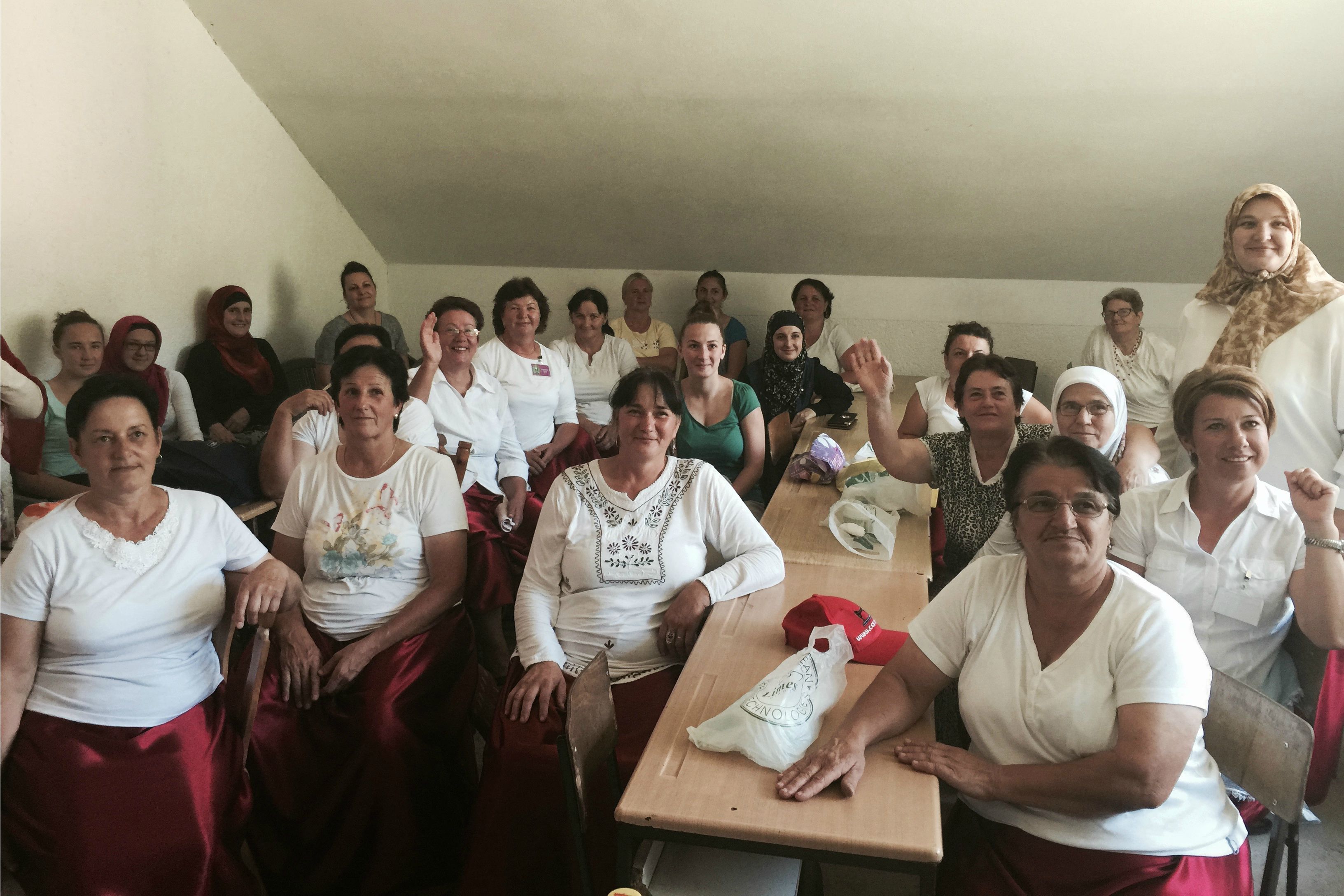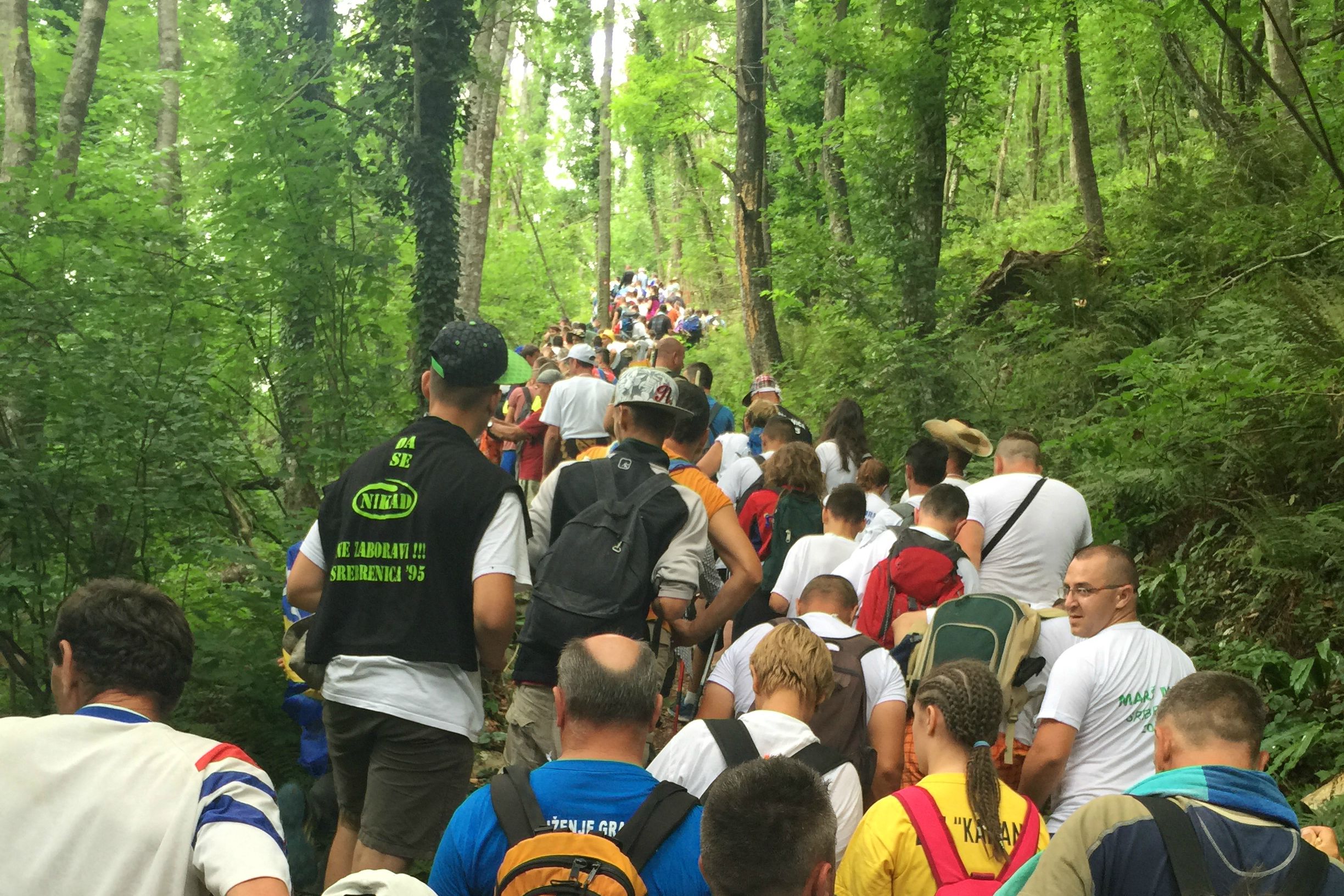Longtime WfWI supporter Lauri Pastrone and her 15-year-old daughter Giovanna participated in the 3-day, 75-miles Bosnia Peace March this past July to commemorate the 20th anniversary of the Srebrenica genocide. Along the way, they met with inspiring women’s associations formed by graduates of WfWI who are strengthening their communities. Read Lauri’s account of the March and the incredible stories of the women and men she met:
Dear Friends & Family --
Giovanna and I wanted to share some notes and images from the life-changing experience we just had in Bosnia. We participated in a 3-day, 75 mile “Mars Mira” peace march to commemorate the 20th anniversary of the massacre of some 8,000 men by the Serbian army when the UN turned them away from the besieged town of Srebrenica. This was Europe's worst atrocity since WWII.
Of the thousands of walkers, our group consisted of 14 people from 6 countries -- all of whom support Women for Women International (WfWI), the organization I co-produced the Share cookbook for.
WfWI actually started in Bosnia and has helped nearly 62,000 Bosnian women survivors rebuild their lives. They have provided life skills training and job training, and helped women form work cooperatives so they can continue to support one another. Visiting Bosnia had the added dimension of allowing us to interact with the WfWI graduates, visit their cooperatives, and stay in their houses along the route.
Before our 3-day trek began, we met some of the courageous women in Udruzenje Zena Krivaja Iska (a women’s cooperative, all graduates of WfWI). Two of the women had just been elected to the local council... making history. Never before have there been women in local government.
 WfWI graduates and members of the Udruzenje Zena Krivaja Iska cooperative. Two of the members recently made history and were the first women electecd to their local council.
WfWI graduates and members of the Udruzenje Zena Krivaja Iska cooperative. Two of the members recently made history and were the first women electecd to their local council.
>>To learn how you can help a woman survivor of war support her family and change her life, click here.<<
Day 1 – 8 July (102 degrees!) An estimated 10,000 people started out together along the 75-mile route. We were among the very few foreigners. The majority were men (we guess about 95%). Some were well into their 70s, including many survivors of the original escape from Srebrenica in 1995. We heard stories remembering those who didn't make it and those who did. The shoes some people wore were scary... sandals, Crocs, torn sneakers. We saw many children walking and parents carrying babies.
An incalculable number of women lost husbands, fathers, and sons in the war. Everyone has a story to tell.
Giovanna was SOOO stellar. Despite the heat and the intensity of the first day, she was one of the first in our group to finish. I was way behind her. Honestly, I was very unsure of how I'd make it into the next day. We were warned that it would be the day of the "big climb."
Volunteers provided thick, boiled coffee in plastic cups (did we mention the 100+ degrees?), and fruit and biscuits were handed out on occasion – all donated by locals.
Thousands on the walk spent the night in open fields with tents provided by the government. They couldn't have gotten very good rest after such a grueling Day 1. But we knew of no complaining.
Day 2 – 9 July
Thanks to huge support from the group, Tiger Balm, ibuprofen, a good sleep in the home of a local family and some home-cooked food, our entire group set out together again on the 2nd day. We started at 8:30AM. A picture-perfect setting in some of the most peaceful, green hills imaginable.
This is hilly terrain. We climbed and climbed. But the weather was well on our side this day. It remained overcast, probably never above 80 degrees. We all embraced what felt like a cold snap and never complained. It was bliss compared to Day 1. We all relaxed more. We heard more stories. Talked with more people.
One man we spoke with, Dominic, who had lost both parents in the war... was too young when they were killed to remember them. He was walking with a broken ankle, and determined to finish. He recognized Brita Schmidt, our friend and Executive Director of WfWI-UK. They had met on the walk 2 years ago.
 Peace March participants climb through the woods on the way to Srebrenica.
Peace March participants climb through the woods on the way to Srebrenica.
Day 3 – 10 July
We started early, knowing we had to make it to Srebrenica by 5:00PM for the ceremony in the cemetery.
It was hot again and sunny, high 80s. This day turned out to be an enormous challenge. There was little flat ground. It was either up or down all day. But everyone was feeling the energy of our finish. We endured. We talked, laughed, and tried our best to stay together on this momentous day.
"The kindness and the laughter and the generosity and the hope of the people there, even after such devastating conflict, was one of the most inspiring things I have ever seen."
- Giovanna
The arrival into Srebrenica was unexpected and very emotional for all of us. Townspeople and others from around Bosnia welcomed all the walkers into town as we arrived group by group, one by one, two by two. Coming into town, we stood out. Clearly, we were foreign, made up mostly of women and teens (there were four amazing, beautiful teenage girls, including Giovanna). Many cheered us and thanked us. Tears of relief, joy, and sadness ran down our cheeks.
We then marched into the cemetery, which you may have seen on the news. It sits across the street from the now-famous Dutch UN headquarters that turned away Bosnians seeking safety. We watched the small caskets (136 of them) with the identified bones of the most recent discovered bodies so the families could bury them the following day.
One of the amazing things is that each day, climbing and walking narrow paths, three generations of walkers, multiple ethnicities, religions, men and women... never did we see any angry outbursts, evidence of frustration or terse verbal exchanges. Not once. We saw humanity at its best. People helping one another... sharing the little bit of food they had, bandages, creams, water. When someone plopped down for a rest in the middle of the path, everyone just walked around them. It was a lesson in peace and understanding. There were Bosnians, Serbs, Croats, and dozens of other nationalities represented.
"It was an incredible feeling, like I was doing something much bigger than myself."
- Giovanna
Gio and I have been reminded of the pointlessness of war and that grievances can never be resolved through fighting and killing. We were also reminded of how important it is to empower women and girls, especially in parts of the world where ethnic and national tensions are high. They are our best peace-makers.
>>WfWI supporter Tracy Craighead also joined the 2014 and 2015 Bosnia Peace Marches, and shared her experiences here.<<
